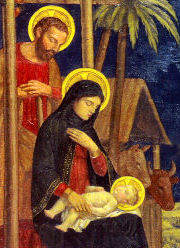
Daily Readings for:January 08, 2014
(Readings on USCCB website)
Collect: Grant us, almighty God, that the bringer of your salvation, who for the world's redemption came forth with newness of heavenly light, may dawn afresh in our hearts and bring us constant renewal. Who lives and reigns with you in the unity of the Holy Spirit, one God, for ever and ever.
RECIPES
ACTIVITIES
o Day Fifteen ~ Activities for the Fifteenth Day of Christmas
PRAYERS
o Meal Prayers for the Christmas Season
o Book of Blessings: Blessing Before and After Meals: Christmas Season (2nd Plan)
o Book of Blessings: Blessing Before and After Meals: Christmas (1st Plan)
· Christmas: January 8th
· Wednesday Christmas Weekday
The Magi are called "saints" for the first time in the writings of Archbishop Hildebert of Tours (1133). In the twelfth century their veneration spread over all of Europe. The authorities of the Church did not prohibit this cult, and Epiphany acquired the popular name of "Feast of the Three Holy Kings" in most countries of Europe.
The name Magi is not a Hebrew word, but of Indo-European origin, and means "great, illustrious." Saint Matthew mentioned the term without explanation because it was well known to the people of Palestine. The Magi originated in Media (Persia), and their caste later spread to other Oriental countries. They were a highly esteemed class of priestly scholars, devoting themselves not only to religion but also to the study of natural sciences, medicine, mathematics, astronomy, and astrology. In several countries they were members of the king's council.

Where did the Magi come from? Saint Matthew gives a general answer: "Wise men from the East." In modern terms, it could have been from any one of the countries of Arabia, Iraq, Iran, Afghanistan, or India. It has never been exactly determined from which of these countries they came.
Quite early in the Christian era a popular tradition conferred on them the title of "kings". This tradition became universal at the end of the sixth century. It was based on Biblical prophecies which described the conversion of the pagans and, although not referring to the Magi, were applied to their visit:
The kings of Tharsis and the islands shall offer presents: the kings of the Arabians and of Sheba shall bring gifts. (Psalms 71, 10) The kings shall walk in the brightness of thy rising.... They all shall come from Sheba, bringing gold and frankincense. (Isaiah 60, 3-6)
The Gospel does not tell us how many they were. The Christians in the Orient had an old tradition of twelve Magi. In early paintings and mosaics they are represented as two, three, four, and even more. In the occidental Church a slowly spreading tradition put their number at three. It does not seem to have any historical foundation, but was probably based on the fact of the threefold presents. Another reason for the number three was the early legend that they represented all humanity in its three great races. Thus one of them was pictured as a member of the black race, and this choice seemed to be confirmed by the Bible:
Let the great ones come forth from Egypt, let Ethiopia stretch out her arms to God. (Psalms 67, 32)

The book Collectanea et Flores, ascribed to Saint Bede the Venerable (735), records an earlier legend of their names and appearance:
The first was called Melchior; he was an old man, with white hair and long beard; he offered gold to the Lord as to his king. The second, Gaspar by name, young, beardless, of ruddy hue, offered to Jesus his gift of incense, the homage due to Divinity. The third, of black complexion, with heavy beard, was called Baltasar; the myrrh he held in his hands prefigured the death of the Son of man.
There is an old legend that when many years had passed the Magi were visited by Saint Thomas the Apostle, who, after instructing them in Christianity, baptized them. They were then ordained to the priesthood and made bishops. It is said that once more the star of Bethlehem appeared to them and reunited them toward the end of their lives. "The city of Sewa in the Orient" is given as the place of their burial.
The legendary relics of the Magi were brought from Constantinople to Milan in the sixth century. In 1164 Emperor Frederick Barbarossa obtained them from the archbishop of Milan and transferred them to Cologne. Their shrine in Cologne was, and still is, the center of many pilgrimages.